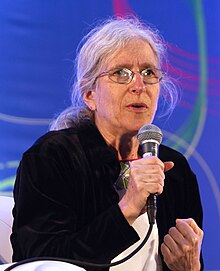Utente:NiccoloRinaldo/Sandbox1
Aviva Chomsky (20 aprile 1957) è una storica, scrittrice e attivista statunitense.
È professoressa di Storia e Coordinatrice degli Studi Latino Americani, Latini e Caraibici alla Salem State University in Massachusetts.[1] Precedentemente ha insegnato al Bates College nel Maine ed è stata una ricercatrice associata ad Harvard University, dove si è specializzata in Storia Caraibica e Latino Americana.

Infanzia[modifica | modifica wikitesto]
È la figlia maggiore dei linguisti Noam e Carol Chomsky. Il nonno paterno, William Chomsky (1896-1977) è stato preside per diversi anni al Gratz College.
Carriera e studi[modifica | modifica wikitesto]
Tra il 1976 e il 1977, Chomsky lavorò per la United Farm Workers Union. Descrisse quest'esperienza come la causa del suo "interesse per la lingua spagnola, per i lavoratori migranti e per l'immigrazione, per la storia del lavoro, dei movimenti sociali e l'organizzazione del lavoro, per le multinazionali e i suoi lavoratori, per come l'economia globale influenzi gli individui, e per come le persone si organizzino per il cambiamento sociale". Chomsky ha conseguito una laurea triennale in spagnolo e portoghese nel 1982 alla University of California a Berkeley, un master in storia nel 1985 e un dottorato in storia nel 1990. Iniziò ad insegnare al Bates College, diventando professoressa associata al Salem State College nel 1997, coordinatrice degli studi Latino Americani nel 1999 e diventando professoressa ordinaria nel 2002.
Il libro di Chomsky "West Indian Workers and the United Fruit Company in Costa Rica 1870–1940" ha ricevuto nel 1997 il Premio per il Miglior Libro dal New England Council of Latin American Studies. Il libro esplora la storia della United Fruit Company, fondata nel 1899 dalla fusione di diverse società statunitensi che costruivano ferrovie e coltivavano banane lungo la costa atlantica della Costa Rica. Inoltre, chiarisce come la forza lavoro, composta principalmente da giamaicani di discendenza africana, abbia sviluppato un proprio sistema socioeconomico parallelo alle attività dell'azienda.
Chomsky è stata attiva nella solidarietà verso l'America Latina e i problemi sui diritti degli immigrati già dagli anni '80. I suoi articoli sui diritti degli immigrati sono apparsi su The Nation[2], HuffPost[3] e TomDispatch, un progetto del Nation Institute, e ha tenuto conferenze in tutto il mondo sui diritti del lavoro e degli immigrati.
Pubblicazioni[modifica | modifica wikitesto]
Libri[modifica | modifica wikitesto]
- Is Science Enough?: Forty Critical Questions About Climate Justice, Beacon Press, Boston Massachusetts. April 2022. ISBN 978-0807015766
- Central America's Forgotten History: Revolution, Violence, and the Roots of Migration, Beacon Press, Boston Massachusetts. April 2021. ISBN 978-080705648-6
- Undocumented: How Immigration Became Illegal, Beacon Press, Boston Massachusetts. 2014. ISBN 978-080700167-7
- A History of the Cuban Revolution, Wiley-Blackwell, New York, NY . Paperback. 224 pages. October 2010. ISBN 978-1-4051-8773-2
- Linked Labor Histories: New England, Colombia, and the Making of a Global Working Class. Duke University Press, Durham, North Carolina. 2008. ISBN 0-8223-4190-5
- The People Behind Colombian Coal/Bajo el manto del carbon, Aviva Chomsky, Garry Leech, Steve Striffler (Editors), 2007. ISBN 958-97995-5-8
- They Take Our Jobs! and 20 Other Myths About Immigration. Beacon Press, July 2007. Paperback: 236 pages . In English. (ISBN 978-0807041567).
- West Indian Workers and the United Fruit Company in Costa Rica, 1870–1940. Baton Rouge: Louisiana State University Press, 1996. ISBN 0-8071-1979-2
- Identity and Struggle at the Margins of the Nation-State: The Laboring People of Central America and the Hispanic Caribbean, (Comparative and International Working-Class History), Aviva Chomsky and Aldo Lauria-Santiago (Editors), 1998. 404 pages. Duke University Press, Durham, North Caroline, (ISBN 978-0822322023)
- The Cuba Reader: History, Culture, Politics, Aviva Chomsky, Barry Carr, Pamela Maria Smorkaloff (Editors), Duke University Press, Durham, North Carolina, January 2004. (ISBN 978-0822331971).
Capitoli[modifica | modifica wikitesto]
- The Dispossessed: Chronicles of the Desterrados of Colombia, Alfredo Molano, Haymarket Books, (ISBN 1-931859-17-5), 2005. (Foreword)
- The Profits of Extermination: How U.S. Corporate Power is Destroying Colombia, Francisco Ramírez Cuellar, Common Courage Press, (ISBN 1-56751-322-0), 2005. (Translation and introduction by Aviva Chomsky)
- Hidden Lives and Human Rights in the United States: Understanding the Controversies and Tragedies of Undocumented Immigration, edited by Lois Ann Lorentzen, Praeger Press (ISBN 1440828474), 2014. (Economic Impact of Migrants)
- Beyond Slavery: The Multilayered Legacy of Africans in Latin America and the Caribbean, edited by Darien J. Davis, Rowman & Littlefield, (ISBN 0742541312), 2007. (The Logic of Displacement: Afro-Colombians and the War in Colombia)
- Salem: Place, Myth and Memory, edited by Dane Morrison and Nancy Lusignan Schultz, Northeastern University Press, (ISBN 1555536506), 2004. (Salem as a Global City: 1850–2004)
- Identity and Struggle at the Margins of the Nation-State: The Laboring Peoples of Central America and the Hispanic Caribbean, edited by Aviva Chomsky and Lauria-Santiago, Duke University Press, (ISBN 0822322188) 1998. (Introduction and Laborers and Small-Holders in Costa Rica's Mining Communities: 1900–1940)
Note[modifica | modifica wikitesto]
Collegamenti esterni[modifica | modifica wikitesto]
- ^ Salem State University | A Proud Massachusetts Public University, su www.salemstate.edu. URL consultato l'11 aprile 2024.
- ^ (EN) Aviva Chomsky, su The Nation, 25 agosto 2014. URL consultato il 17 aprile 2024 (archiviato dall'url originale il 17 aprile 2024).
- ^ (EN) Bill Clinton And Barack Obama Laid The Groundwork For Trump’s Immigration Policies, su HuffPost, 25 aprile 2017. URL consultato il 17 aprile 2024 (archiviato dall'url originale il 17 aprile 2024).